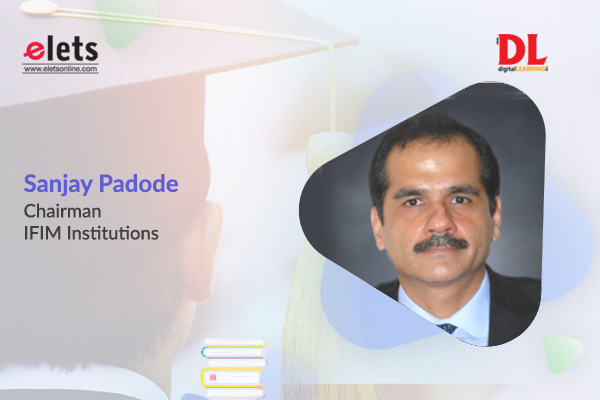
Sanjay Padode is the Chairman of IFIM Institutions and the Founding President of VijayBhoomi University. He spoke to Digital Learning Magazine about the advantages of the online learning model.
What are the advantages and disadvantages between the traditional and online learning model?
The basic difference between traditional and online learning models is the medium of delivery. The success of a learning model depends upon the curriculum design, choice of an appropriate faculty and the opportunity for a student to reflect and apply the newly learnt knowledge. The traditional teaching method commonly referred to as face to face teaching method is time tested and the best in-class faculty who have years of experience find this method to be more effective.
This method requires commitment of time and physical presence during the teaching hours. Lectures followed by group work, tutorials and assignments helps the student imbibe knowledge through reflection and application whilst being supervised. On the other hand the online teaching method decimates the physical barriers and time constraints, allowing the teacher to deliver classes from any place to any place.
The teacher and student enjoy the flexibility of time and hence can schedule such sessions based on their work schedules and other priorities. Thus enabling continuous learning from practicing professionals and faculty from anywhere. In a way the online learning technology has flattened the learning hierarchy and democratized learning.
A good curriculum design would leverage both traditional and online teaching methodology to maximize learning for students and widen the choices available to the learner. In my view online has to be looked upon as an add-on medium and the same needs to be combined with traditional teaching to create the best value proposition for the learner.
Do you think digitalisation of education has helped in globalization of education and shrinking the borders?
Digitalisation has flattened the world. Education is also being impacted by the same. Borders have shrunk, ability to scale has been enhanced, quality education is easily accessible and the emerging competitive environment is also containing the inflation in education. This is happening and will continue to happen.
It is said that online mediums have the power to meet policy parameters of NEP – Access, Equity, Quality, Affordability and Accountability. Your views.
Yes indeed. Online education is accelerating pedagogical innovations. The use of simulation, augmented reality and virtual reality is enhancing the efficacy of learning. Coupled with new models of apprenticeships, virtual internships, mentoring and coaching learning is becoming more engaging and relevant. Online education is no more a one way outreach, it is interactive and as mentioned if leveraged correctly and blended rightly with traditional methods of teaching can prove to be the most effective form of learning. The government has identified this rightly and in my personal view NEP is a transformational step and not an incremental change. If NEP is implemented in spirit and word, it will help India reap its demographic dividend.




















